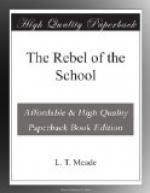“But there!” said the old man hastily. “It’s splendid for Ruth. She’s got into that school, and she’s trying for a scholarship. I know what Ruth tries for she will get, for her brain is of that fine quality that could not brook defeat, and her mind is of that high order that it must adjust itself to true learning. I was a bit of a scholar when I was young, although I made my money in grocery. Well, well! Ruth is all right. Even if the old man can’t square up the ledger, Ruth is as right as right can be. Thank you, Miss—I can’t remember your name—– but thank you, little Irish miss, for coming to see me; and good-bye.”
Kathleen found herself outside the room. Mrs. Craven was not in the kitchen. Ruth and Kathleen went into the garden.
“How can you stand it?” said Kathleen. “Doesn’t it break your heart to see him?”
“Oh no,” said Ruth. “You see, I am accustomed to him. He talks like that. I am sorry he is so bothered about the accounts, but perhaps that phase will pass.”
“He is so pleased about you and the scholarship.”
“Yes,” said Ruth. She turned pale. “Whatever happens,” she added, “he must never know.”
“What do you mean about whatever happens?”
“He must never know if I do not get it. Good-bye now, Kathleen. I am glad you have seen grandfather and granny. I must go back to granny now. She is very tired; she gets so little rest at night.”
Kathleen went slowly home. The meal was over at the Tennants’, but somehow her couple of potatoes had satisfied her. She felt much more sober than she had done in the morning; she was inclined to think, to consider her ways. She felt an uncomfortable sensation of being haunted by the faces of Ruth and the old man.
“But of course Ruth will get her scholarship,” she said to herself. “Of course—of course her grandfather is right. Her brain is of the right order, and her mind is attuned to learning. How nicely he spoke, and how beautiful he looked—how like my dear old grandfather who has been with God for so many years now.”
There came a loud rat-tat at the front-door. David went out and brought in a telegram. It was addressed to Kathleen. She opened it in some surprise, and read the contents slowly. There was amazement on her face; a feeling of consternation stole into her heart. The telegram, not a long one, was from her father:
“Have just seen
Aunt Katie O’Flynn. Do not approve of your
society. Squash
the whole thing at once, or expect my serious
displeasure.—O’HARA.”
“Is there an answer?” asked David.
“No,” said Kathleen. “I mean yes. Yes, I suppose so. Can I have a form? Mrs. Tennant, can I have a telegraph form?”
Mrs. Tennant began to hunt about for one. Telegrams were by no means common things at the Tennants’ house. David suggested that the messenger boy might have one. This turned out to be the case. Kathleen began to write, but she suddenly changed her mind.




